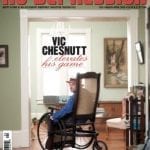Hubert Sumlin – Who’s gonna share them shoes?
“Nashville, Tennessee was my place, man! I had every country record you could name then; I used to listen to the Grand Ole Opry. That was my music; I’m not kiddin’ you — just night and day.” Hubert Sumlin
This is a story about the give-and-take between bands — between friends and rivals, generations and races, instrumentalists and singers. It’s about Hubert Sumlin, a man who has both given to musical traditions and taken from them, and who was sometimes called “Little Hubert” back in the day — because anybody was going to look small standing there playing guitar next to the near-300-pound pulsating, flying, muscular bulk of Howlin’ Wolf.
Today he’s often called “the guitar players’ guitar player,” for while Hubert’s not quite a household name, those who revered him, learned from him, played behind him, and sometimes tried (in vain) to imitate him include Buddy Guy, Jimi Hendrix, Jimmy Page, Eric Clapton, Keith Richards, Robert Cray, and one he tutored directly, Stevie Ray Vaughan. They’ve all made a public point of acknowledging Sumlin’s importance.
You hear Sumlin on the original Wolf recordings of “Sittin’ On Top Of The World”, “Little Red Rooster”, “Shake For Me”, “Three Hundred Pounds Of Joy” and “Killing Floor”, and on the mind-boggling, beyond-risky guitar solo on “Hidden Charms” — which is to say, on some of the great, fire-breathing sides in American music history. Just lately, it’s been easier to see him, too; in theaters, in the Lightning In A Bottle concert film, and on video via the very special Howlin’ Wolf Story and American Folks Blues Festival, Volume Two DVDs, and the Crossroads Guitar Festival set.
When Howlin’ Wolf (born Chester Burnett), died on January 10, 1976, Hubert, a generation younger, was listed as his son at the funeral to honor their 23 years working together, and their special, and volatile, relationship. The subtle and seemingly telepathic interplay between Sumlin’s leads and the Wolf’s unmistakable, unsurpassable graveled vocalizing was as legendary on the blues scene as, say, the Billie Holiday-Lester Young voice and sax relationship was in jazz. Sumlin’s hair-trigger guitar added sudden, stabbing fills; would swing between single-note runs and whomping chords, powerful and delicate at the same time; and always, always played off what Wolf had just said — or was about to say.
That responsive interaction is Hubert Sumlin’s prime legacy as a guitarist.
As shy as Sumlin can be, he did not, during two long and pleasurable interviews, hesitate to proclaim the basic truth about those years. “I tell you what, man: Wolf had the voice — and I had the sound. He said, ‘Hubert, you have a sound — and it’s my sound, the sound that I lack.'”
Following a string of albums on which Sumlin both played and showed off his previously unknown vocal smarts, his new disc, About Them Shoes, features Eric Clapton, Keith Richards, James Cotton and David Johansen singing and playing along with Sumlin. Recorded five years ago and delayed by the demise of the small label it was made for, it was finally released January 25 by Tone-Cool/Artemis. And it will surprise some, since it’s a salute to the songs and music not of Wolf, but of his arch-rival Muddy Waters, featuring tunes such as “Long Distance Call” and “I’m Ready”.
It’s not always recalled that Sumlin actually left Wolf’s band to play with Muddy for several stretches — one source of irritation between the two Chicago blues giants. Wolf, if seemingly the more explosive of the two great singers onstage, was more of a businessman: a taskmaster as a bandleader who was quick to fine or fire musicians for lateness, drinking on the job, or blowing their parts. Sumlin responded to an interesting counter-offer in 1956, a little over a year after he had joined Wolf’s band in Chicago.
“Muddy sent a chauffeur over to the Zanzibar Club, where we was playing, to get me!” Sumlin recalled. “What he did, really is — he bribed me. He tripled the money that I was making with Wolf!”
And did Waters turn out to be easier to work for?
“I tell you what — both of them was kind of hard! At the beginning, man, they expected more from you than you could give. But, I learned.”
Waters toured for grueling stretches, it turned out, and would often sing just a few numbers while having the band play for hours. This only added to the visibility of his famed backing musicians — Little Walter on harmonica, Otis Spann on piano, Willie Dixon on bass, Jimmy Rogers on guitar, to the point that they developed recording careers of their own. And it was a very hard-drinking, hard-living group.
The retiring Sumlin didn’t find that whole setup endlessly appealing. In truth, Wolf was as watchful, even paternal, with his less-publicized musicians as he was tough — supplying union dues, unemployment insurance, holding out Social Security (rare for bands at any time).




